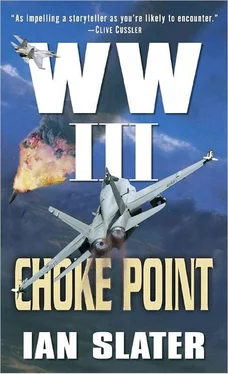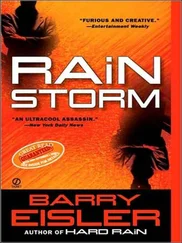“Exactly,” confirmed Freeman, calling COMSUBPAC-GRU-9 to turn Darkstar around back toward Cape Flattery. From the cape it could do another run along the seventy miles of coastline to Port Angeles, Freeman lowering the IR intensity recognition level. “Cold caves with a nearby anomaly,” Freeman repeated. “That’s what we’re looking for.”
“General, where’s that Navy NR-1B research sub?” asked Aussie.
Freeman glanced down at his watch, the bags under his eyes evidencing his lack of sleep over the last twenty-four hours. “It should be here by now.”
In fact, the Globemaster III ferrying the U.S. Navy’s research sub had landed at the Air Naval Station on Whidbey Island, one of the most beautiful islands in America, and among the longest. The highly classified midget sub was the one Bill Heinz had in mind when he complained to Charlie Riser about the kind of secrecy, interservice, and interagency rivalry that prevented vital information from getting to the right people in time, as had happened before 9/11.
While in the process of deplaning from the giant transport onto a wide-bodied Mack hauler normally used to move houses up and down the island, the Marine guard platoon of thirty men aboard ten Humvees were ordered to establish and maintain a “No Go Zone,” even on the naval station’s own runway, to provide a moving protective moat of a hundred yards in diameter around the small nuclear-powered sub. With “Deadly Force Authorized,” anyone, uniformed or civilian, violating the NGZ was to be shot. The problem, however, was that since the arrival of and transport of the sub was designated “Secret,” how could anyone be expected to know about the NGZ? It was bureaucratic nonsense, but so worried were the Navy and Homeland Defense about another attack following the Cherry Point disaster, that the rules of antiterrorist warfare, in the words of Homeland Defense director Harry Hawthorn, would have to be “amended as necessary.” Whether such amendment, however, lay within the provenance of the Marine guard officer on the spot, or with COMSUBPAC-GRU-9’s Jensen, or with the commandant of the Marines, was not clear.
Jensen, having arrived and placed himself in the lead Humvee, had been fretting for hours about the safe delivery of the NR-1B sub to the launching ramp at Keystone. He was convinced that not only had his CNO hopes gone down with Turner, Utah , and the Aegis cruiser, but any hitch en route to the ramp would mean the lesser but just as personally painful humiliation of demotion. When his cell phone rang, he started as if jabbed with a cattle prod. His driver, a gum-chewing Spanish-American, PFC Mendez, pretended not to notice.
“Margaret!” he snapped censoriously.
“CNN’s reporting that John Rorke and that scientist—”
“Alicia Mayne.”
“Yes. They’ve been found. Adrift on some wreckage, CNN says. Picked up off Vancouver Island, being taken to Port Townsend’s hospital. John Rorke looks rough, but he’s all right. He vindicated you on CNN. Said there was absolutely no warning when Utah was hit. The woman’s not so good, burns from the waist up, apparently. There was an oil slick on fire after the boat had sunk.” Margaret paused. “That CNN woman, Marte Price, has been calling, left I don’t know how many messages. I think you’re going to have to say something, dear. She called again just before—”
“When I get home,” he said sharply. Margaret could hear the background noise of the Humvee and knew he must be with a driver. “I’ll send get-well cards and condolences to all the Utah ’s boys and their families. And to Alicia Payne—”
“Mayne, with an M.”
“Yes,” said Margaret. “I’ll try to see her. What a dreadful time it is, Walter. All those families.”
“Admiral!” the Humvee’s radio blared. “Bravo One Charlie One.” It was an incoming message from the first of the twenty outriders assigned to protect the NR-1B on its way to the Keystone launch ramp. “We have a bogey five klicks from you.”
“Describe,” cut in the convoy’s Marine commander.
“Keep moving,” Jensen told his Humvee driver.
“Refugee column,” said the Bravo One. “ ’Bout two hundred meters long on the road. Estimate ten to fifteen vehicles. Looks like mostly families. Fifty, sixty people.”
“Admiral?” said the Marine major. Jensen knew the major was asking him who he wanted to exercise tactical command.
“It’s your call, Major,” Jensen told him.
“Yessir.” The major instructed, “Bravo One, get all those people out of the vehicles and off the road — hundred yards away at least. Make sure no one — repeat, no one — remains in the vehicles. Dogs, cats — nothing. I’ll send replacement riders from Bravo Three to scout ahead of you while you take care of this.”
“Roger that!” confirmed the Bravo One leader, who had already begun telling his men to move the refugees out of their cars and pickups into the adjacent field.
“What?” bellowed one of the refugees, an elderly man. “That’s a damned cranberry bog in there — under two, three, feet o’ water. We got kids here!”
“Move off the road now!”
“Come on, Ralph,” a woman told the man. “Do as they say.”
“Thank you, ma’am,” said the cop, one of the local policemen with knowledge of the area who’d been seconded to assist the Marines guarding the convoy. “There’s a good reason for it.”
“Damn well better be!” growled Ralph, but the cop and his other four comrades in Bravo One were relieved. Everyone’s nerves were on edge. Some of the police riders’ own families were leaving the island. “ American refugees,” one of the cops had said. “It breaks your heart.”
“How long we got to wait?” asked Ralph.
“No more’n an hour, chief.”
“Jesus Christ — you know how cold it is in those damn cranberry bogs?”
“Ralph, c’mon! No sense in arguin’. They got the guns.”
It was 1:00 P.M., and Charles Riser, who’d been unsuccessful in attempts to get through to General Chang, whom he hoped might have learned something more about Li Kuan’s whereabouts, had caught the red-eye flight to Nanjing. He’d been waiting impatiently outside Nanjing Military District HQ since 9:00 A.M. Once more he pressed the button. General Chang’s aide-de-camp, a smartly turned out young captain in sharply creased field greens, appeared, and again Riser asked politely to see the general.
The response was in immaculate Mandarin: “The general is in conference and cannot be—”
“For four hours ?” pressed Riser. “You did tell him it was urgent?”
“Yes,” Mr. Riser,” came the reply, this time in perfect English, the sudden switch from Mandarin calculated, Riser thought, to surprise him.
It did. By the time he’d thought of a follow-up question, Chang’s aide had closed the door. Again Riser heard the slide of the dead bolt. “Damn!” Now he was absolutely sure Chang wasn’t in Nanjing. Had they arrested him?
Meanwhile, the U.S. embassy in Beijing was receiving complaints about Riser’s persistence. Military affairs, Nanjing reminded Bill Heinz, were not Mr. Riser’s concern. Finally, Bill Heinz asked to see the ambassador, and told him, straight out, “Mr. Ambassador, I like Charlie Riser as much as anybody else, and I realize the death of young Mandy has undone him. But we all have our problems, and we have to move on. He’s making a damn nuisance of himself with the PLA.”
“Thought that was your job, Bill?” said the ambassador flippantly.
Bill Heinz flashed his diplomatic smile. “This time he took off to Nanjing to see General Chang.”
“On our time or his?”
“Ah … his. Took two days’ leave, but—”
Читать дальше












